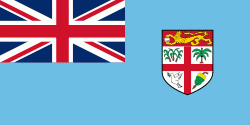Labasa (Labasa)
Labasa is a town in Fiji with a population of 27,949 at the most recent census held in 2007.
Labasa is located in Macuata Province, in the north-eastern part of the island of Vanua Levu, and is the largest town on the island. The town itself is located on a delta formed by three rivers – the Wailevu, the Labasa (after which the town is named), and the Qawa. The latter two are connected by an 8-kilometre canal. The township historically served the sugar cane farms and farm workers with harvesting season resulting in significant seasonal employment although the township is now less dependent on the sugar industry. The farmers market offers seasonal produce and seafood. The main street is lined with small family run businesses, supermarkets and restaurants offering a lively pedestrian thoroughfare.
The surrounding areas of Labasa are mostly farming areas, which contribute to much of the industry in the town. The largest crop grown is sugar cane. The large Fiji Sugar Corporation sugar mill on the outskirts of Labasa town is the only such mill on the island.
Recently, due to political changes and loss of overseas markets, sugar cane farming and production has been steadily decreasing. This has been reflected in the increasing migration of people to the main island of Viti Levu, in search of employment opportunities.
Labasa Hospital is the referral center for all health centers and hospital on the island of Vanua Levu, and has recently been expanded.
Labasa is generally an agricultural town, off the tourist track. The Labasa Airport is located in Waiqele about 7km from the town centre with multiple daily domestic flights to Nausori and Nadi international airports. Passenger ferry connections require an overland trip to either Nabouwalu or Savusavu. Labasa has a couple of hotels to stay in (Takia/Travel Lodge and Grand Eastern Hotel). There is at least one movie theatre and several restaurants in the main street providing a range of local and Chinese flavours.
There is a fairly large market towards the end of the town where one can buy and sample a range of foods, spices, fish, poultry, goats and other local products. A large taxi stand and a bus stop is also by the market.
It also has some popular tourist spots while the people of Labasa are quite well known for their hospitality.
Labasa is located in Macuata Province, in the north-eastern part of the island of Vanua Levu, and is the largest town on the island. The town itself is located on a delta formed by three rivers – the Wailevu, the Labasa (after which the town is named), and the Qawa. The latter two are connected by an 8-kilometre canal. The township historically served the sugar cane farms and farm workers with harvesting season resulting in significant seasonal employment although the township is now less dependent on the sugar industry. The farmers market offers seasonal produce and seafood. The main street is lined with small family run businesses, supermarkets and restaurants offering a lively pedestrian thoroughfare.
The surrounding areas of Labasa are mostly farming areas, which contribute to much of the industry in the town. The largest crop grown is sugar cane. The large Fiji Sugar Corporation sugar mill on the outskirts of Labasa town is the only such mill on the island.
Recently, due to political changes and loss of overseas markets, sugar cane farming and production has been steadily decreasing. This has been reflected in the increasing migration of people to the main island of Viti Levu, in search of employment opportunities.
Labasa Hospital is the referral center for all health centers and hospital on the island of Vanua Levu, and has recently been expanded.
Labasa is generally an agricultural town, off the tourist track. The Labasa Airport is located in Waiqele about 7km from the town centre with multiple daily domestic flights to Nausori and Nadi international airports. Passenger ferry connections require an overland trip to either Nabouwalu or Savusavu. Labasa has a couple of hotels to stay in (Takia/Travel Lodge and Grand Eastern Hotel). There is at least one movie theatre and several restaurants in the main street providing a range of local and Chinese flavours.
There is a fairly large market towards the end of the town where one can buy and sample a range of foods, spices, fish, poultry, goats and other local products. A large taxi stand and a bus stop is also by the market.
It also has some popular tourist spots while the people of Labasa are quite well known for their hospitality.
Map - Labasa (Labasa)
Map
Country - Fiji
 |
 |
| Flag of Fiji | |
The majority of Fiji's islands were formed by volcanic activity starting around 150 million years ago. Some geothermal activity still occurs today on the islands of Vanua Levu and Taveuni. The geothermal systems on Viti Levu are non-volcanic in origin and have low-temperature surface discharges (of between roughly 35 and 60 C).
Currency / Language
| ISO | Currency | Symbol | Significant figures |
|---|---|---|---|
| FJD | Fijian dollar | $ | 2 |
| ISO | Language |
|---|---|
| EN | English language |
| FJ | Fijian language |















